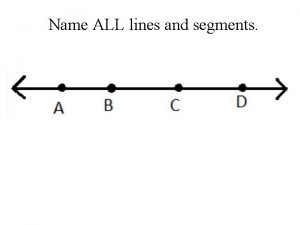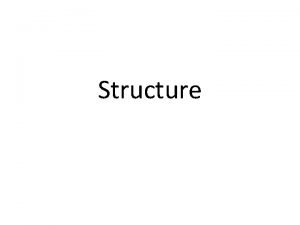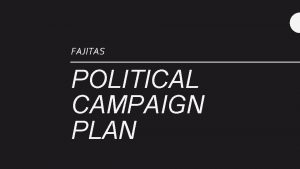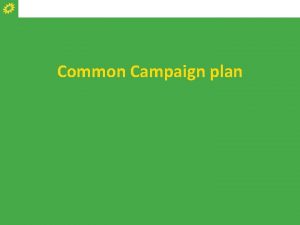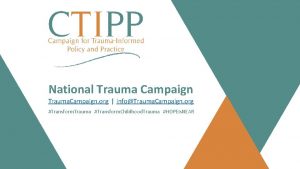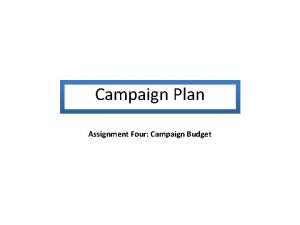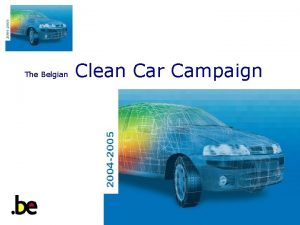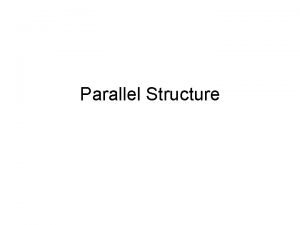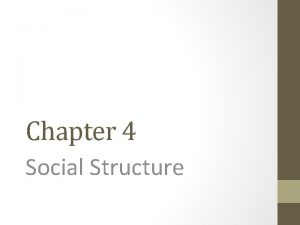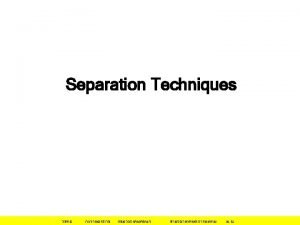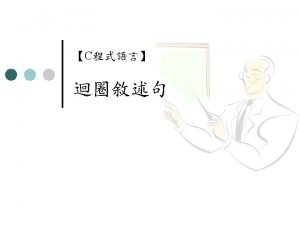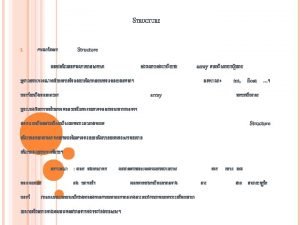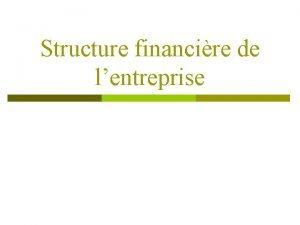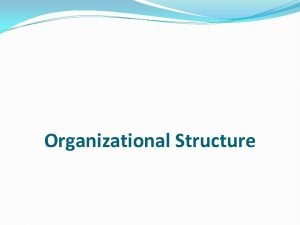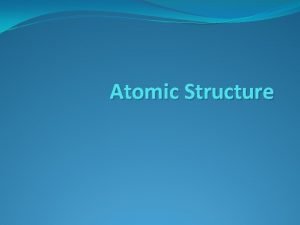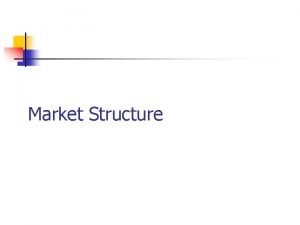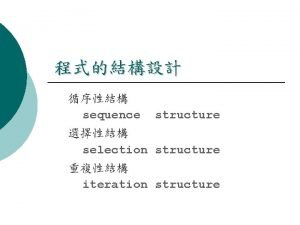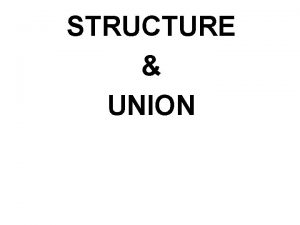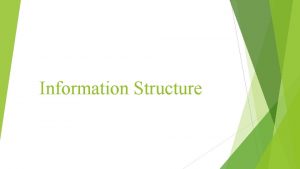The Campaign The Structure of a Campaign All

























- Slides: 25

The Campaign

The Structure of a Campaign • All campaigns have common characteristics. – Each election campaign consists of several smaller campaigns that balance one another. • • • Nomination Campaign General Election Campaign Personal Campaign Organizational Campaign Media Campaign

Nomination Campaign • That part of a political campaign aimed at winning a primary election – Candidates adjust to spotlight – Seek the support of party leaders and interest groups, test themes, and slogan – Critical time for gaining and maintaining support within the party and the broader electorate – Candidate must be careful not to move too far to his/her party’s extreme during the nomination campaign. Could be harmful during the general election.

General Election Campaign • Part of a political campaign aimed at winning the general election – – Occurs after candidate has won party’s nomination Focus on gaining support from groups and voters Decide on issues to emphasize Adopt a brief theme to serve as rallying cry • “A Stronger America” – 2004 Kerry/Edwards • “In Your Heart, You Know He’s Right” – 1964 Goldwater – Candidate must also define his or her stance on other topics of interest to voters.

Bush Campaign Organization Pearson Education, Inc. © 2006

The Personal Campaign • That part of the political campaign concerned with presenting the candidate’s public image – Candidates try to meet as many people as possible. – Exhausting schedule – Little time for family, reflection, or longrange planning

The Organizational Campaign • That part of the political campaign involved in fund-raising, literature distribution, and all other activities not directly involving the candidate – Organizational activity funds and supports the campaign – Volunteers • Voter canvas: process by which a campaign reaches individual voters, either by door-to-door solicitation or by telephone.

The Organizational Campaign • GOTV – a push at the end of a political campaign to encourage supporters to go to the polls • Campaign manager – the individual who travels with the candidate and coordinates the many different aspects of the campaign • Campaign consultant – the private sector professionals and firms who sell to a candidate the technologies, services, and strategies required to get the candidate elected • Finance chair – a professional who coordinates the fund-raising efforts for the campaign.

The Organizational Campaign • Finance chair – A professional who coordinates the fund-raising efforts for the campaign • Pollster – A professional who takes public opinion surveys that guide political campaigns • Direct Mailer – A professional who supervises a political campaign’s directmail fund-raising activities Do consultants strip the campaign of substance? Reduce them to a clever bag of tricks for sale? Can voters tell the difference between a good candidate versus a bad one?

The Media Campaign • That part of the political campaign in which the candidate reaches out to the voters, in person or via the media, to create a positive impression and gain votes – Communication director: develops the overall media strategy. – Press secretary: interacts and communicates with journalists. – Media consultant: produces candidate’s television, radio, and print ads.

The Media and Campaigns • What voters hear and see of the candidate is primarily determined by – Paid media – Free media • The amount, form, and content of paid media are dictated by the campaign. • Free media consists of independent press coverage.

Paid Media • Positive ad – Advertising on behalf of a candidate that stresses the candidate’s qualifications, family, and issue positions, without reference to the opponent • Negative ad – Advertising on behalf of a candidate that attacks the opponent’s platform or character

Paid Media • Contrast ad – Ad that compares the records and proposals of the candidates, with a bias toward the sponsor • Spot ad – Television advertising on behalf of a candidate that is broadcast in sixty-, thirty-, or ten-second duration • Inoculation ad – Advertising that attempts to counteract an anticipated attack from the opposition before the attack is launched

Free Media • Coverage of the campaign – Newsworthy – View candidates with suspicion – Obsessed with the “horserace” – Expectations and predictions Pearson Education, Inc. © 2006

Campaign Media Strategies • Isolate candidate from the press • Campaign stages media events • Spin • Circumvent press with entertainment-oriented talk shows – a less critical forum • Take great care with debates

Technology and Campaign Strategy • Technological advances impacted political campaigns • Direct access to voters • Can gather and disseminate information better than ever – Rapid-response techniques • The formation of prompt and informed responses to changing events on the campaign battlefield • Internet • Recorded phone messages

Campaign Finance • Federal Election Campaign Act (FECA) • Bipartisan Campaign Finance Reform Act 2002 – Mc. Connell versus FEC • Concluded that the government’s interest in preventing political-party corruption overrides the free speech rights to which the parties would otherwise be entitled

Sources of Political Contributions • Political money regulated by the federal government (FECA 1971). This money can come from – Individual Contributions – Political Action Committee Contributions – Political Party Contributions – Member-to-Candidate Contributions – Candidates’ Personal Contributions – Public Funds – Independent Expenditures

Growth in Total Contributions by PACs

Expenditures by PACs in 2004 Election Cycle

PACs Pearson Education, Inc. © 2006

Internet • Has the potential to alter the way money is raised for campaigns. – Mc. Cain 2000 – Dean 2004 • Promises headaches for FEC – Business links with campaign link? Are these in-kind contributions? • Yes – Can internet funds be matched by public funds during the presidential nomination campaign? • No Pearson Education, Inc. © 2006

Soft Money and Issue Advocacy Advertisements • Soft Money – The virtually unregulated money funneled by individuals and political committees through state and local parties – Now prohibited under BCRA – Result: Hard money fundraising increased and the emergence of 527 s

How the Bipartisan Campaign Reform Act of 2002 Alters Money Flow

Are PACs Good or Bad for the Process? • The Bad – PACs are the embodiment of corrupt special interests that use their contributions to buy votes of legislators. • Evidence is mixed – Moreover, the less affluent and minority members of our society do not enjoy equal access to these political organizations.
 Name a point that is collinear with the given points
Name a point that is collinear with the given points Campaign organizational structure
Campaign organizational structure Hình ảnh bộ gõ cơ thể búng tay
Hình ảnh bộ gõ cơ thể búng tay Bổ thể
Bổ thể Tỉ lệ cơ thể trẻ em
Tỉ lệ cơ thể trẻ em Chó sói
Chó sói Tư thế worm breton
Tư thế worm breton Chúa yêu trần thế alleluia
Chúa yêu trần thế alleluia Các môn thể thao bắt đầu bằng tiếng đua
Các môn thể thao bắt đầu bằng tiếng đua Thế nào là hệ số cao nhất
Thế nào là hệ số cao nhất Các châu lục và đại dương trên thế giới
Các châu lục và đại dương trên thế giới Công thức tính độ biến thiên đông lượng
Công thức tính độ biến thiên đông lượng Trời xanh đây là của chúng ta thể thơ
Trời xanh đây là của chúng ta thể thơ Mật thư anh em như thể tay chân
Mật thư anh em như thể tay chân 101012 bằng
101012 bằng độ dài liên kết
độ dài liên kết Các châu lục và đại dương trên thế giới
Các châu lục và đại dương trên thế giới Thể thơ truyền thống
Thể thơ truyền thống Quá trình desamine hóa có thể tạo ra
Quá trình desamine hóa có thể tạo ra Một số thể thơ truyền thống
Một số thể thơ truyền thống Cái miệng bé xinh thế chỉ nói điều hay thôi
Cái miệng bé xinh thế chỉ nói điều hay thôi Vẽ hình chiếu vuông góc của vật thể sau
Vẽ hình chiếu vuông góc của vật thể sau Nguyên nhân của sự mỏi cơ sinh 8
Nguyên nhân của sự mỏi cơ sinh 8 đặc điểm cơ thể của người tối cổ
đặc điểm cơ thể của người tối cổ V. c c
V. c c
